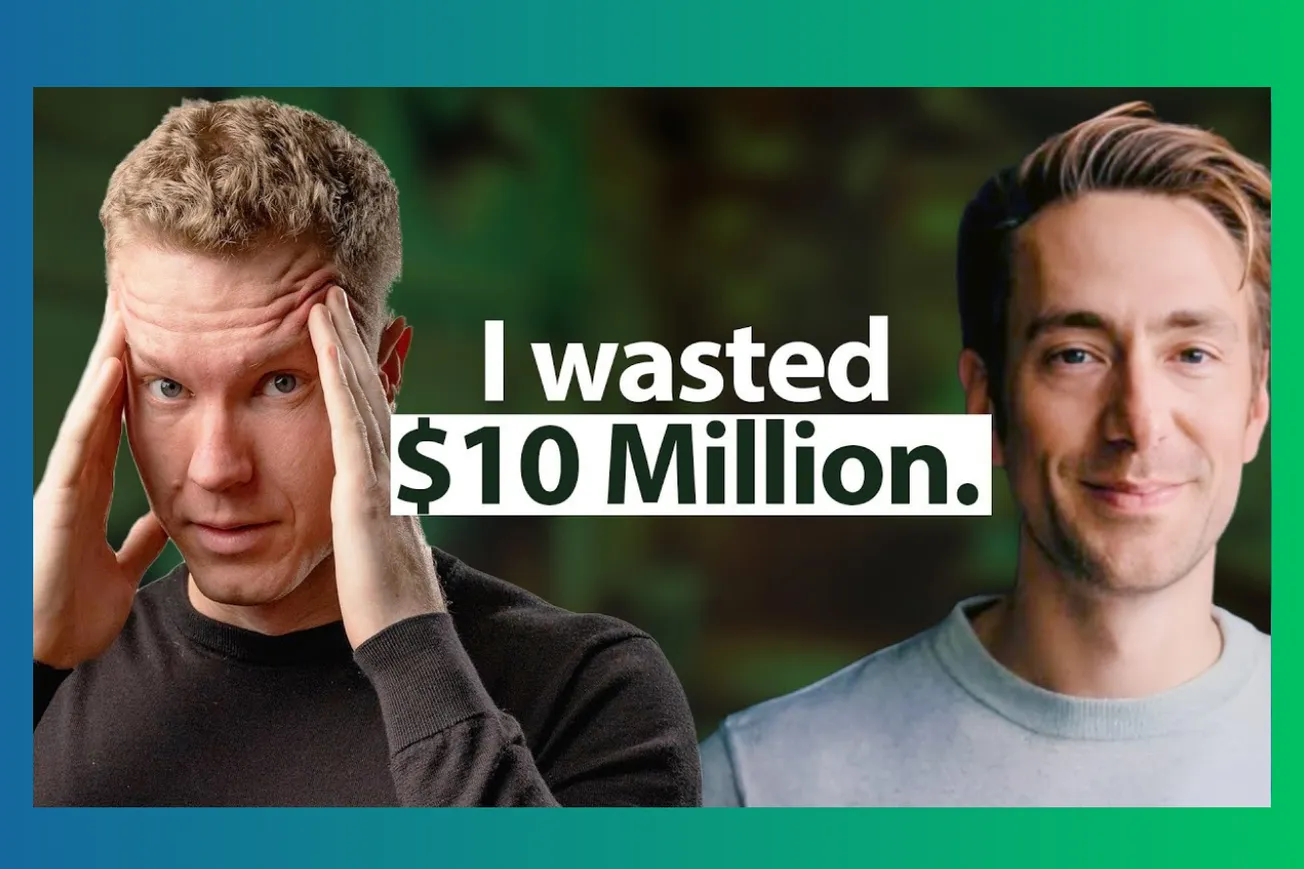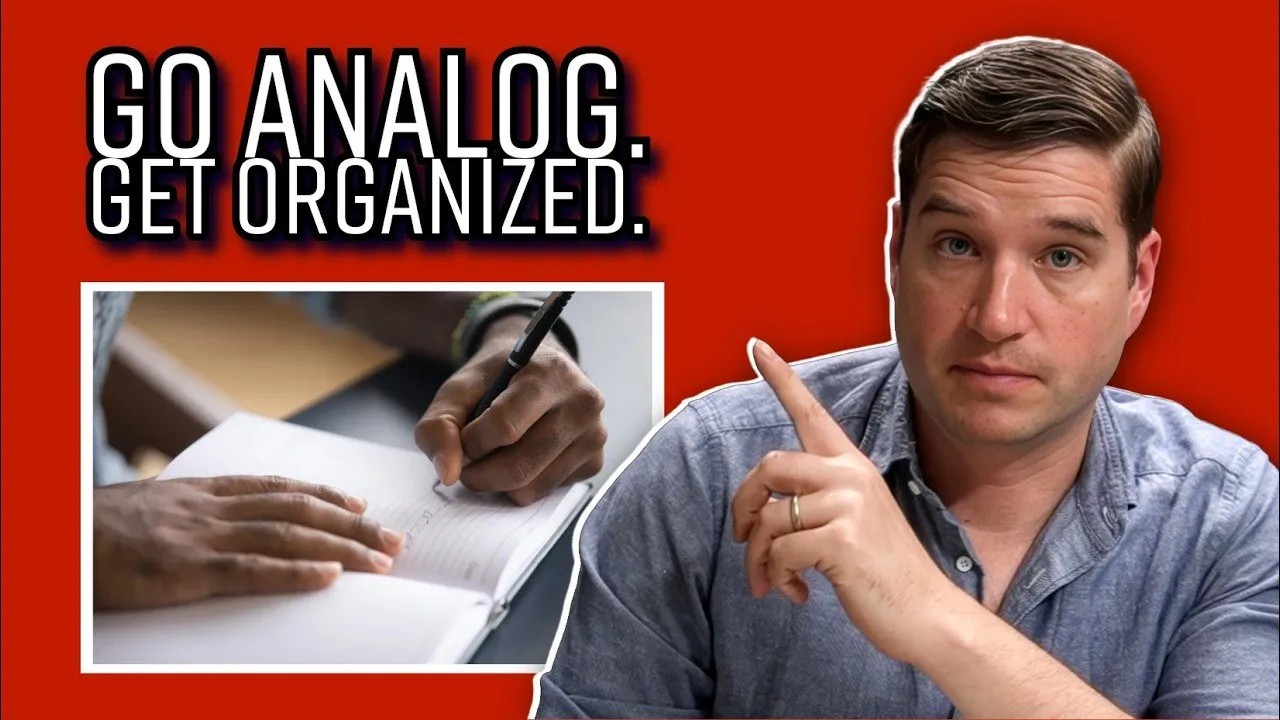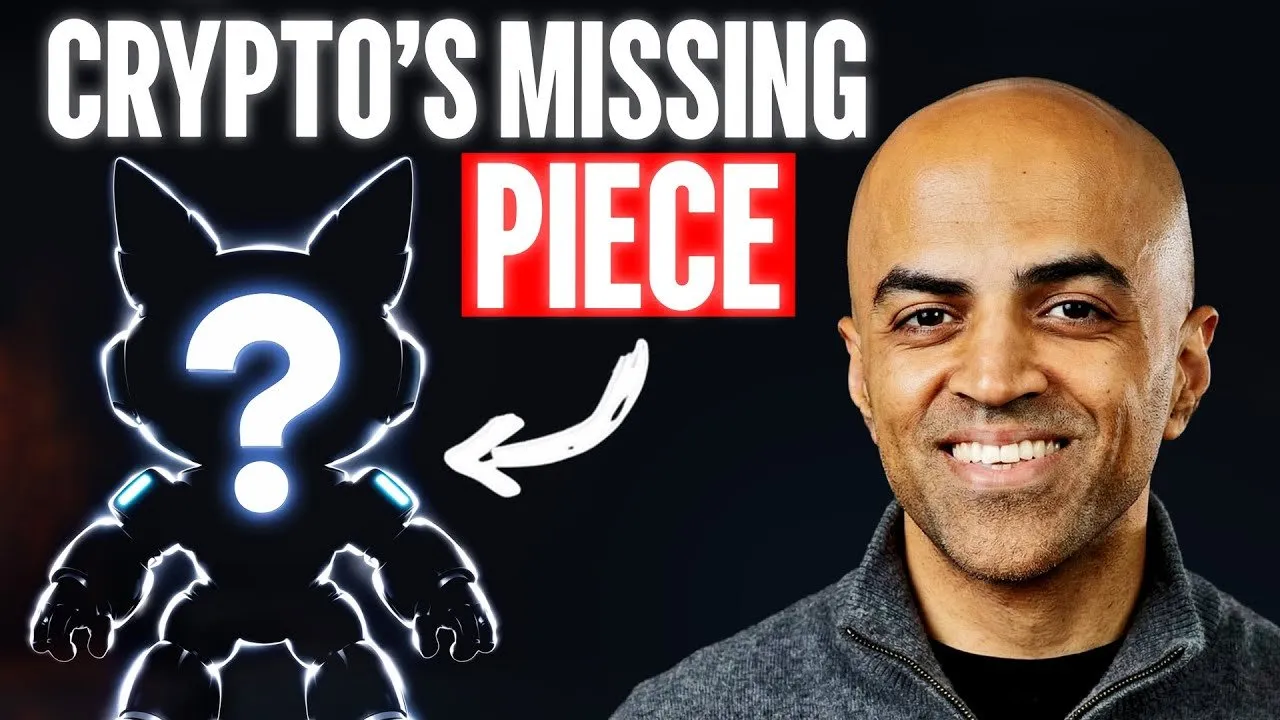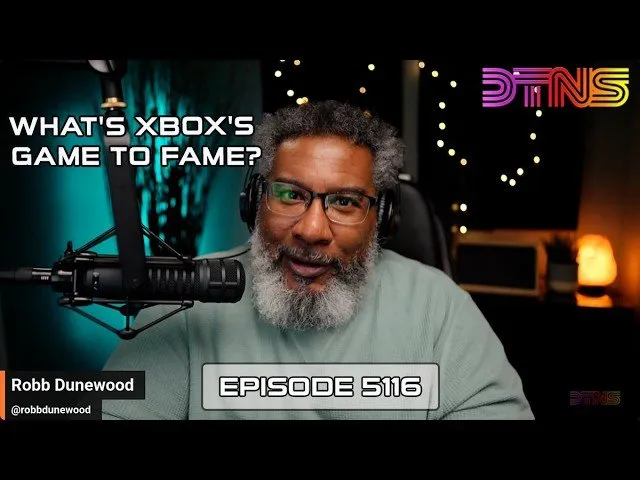Table of Contents
Andrew Wilkinson built a $500M fortune before 35, learned the hard way what's worth buying, and plans to die with zero. Here's his brutal honesty about money mistakes.
Discover which luxury purchases created guilt and isolation versus the investments that enhanced family connections and business opportunities.
Key Takeaways
- Andrew achieved early wealth paying himself $250-500K annually from his design agency while reinvesting profits into acquiring multiple businesses
- Nearly went bankrupt in 2008 when a client demanded full refund after market crash, leaving him with only $500 in the bank despite previous success
- Crossed nine figures when WooCommerce went public, with his personal stock worth over $200 million, making him realize his total portfolio approached $1 billion
- Regretful purchases include Porsche 911 Turbo (uncomfortable, attracted wrong attention), yacht charter ($200K+ per week for isolation), and unused second homes
- Worthwhile investments: primary waterfront home, lake house 45 minutes away for family connection, and private jet access for business relationship building
- Money created family power dynamics and intimidation rather than joy, with parents feeling embarrassed about wealth disparity and brothers experiencing work conflicts
- Charity and community investment proved more complex than expected, losing $5M on well-intentioned projects that resulted in negative experiences and criticism
- His goal is to die with zero assets, giving children only "awesome Social Security" for basics while directing wealth toward foundation work
- Spending money is a different skill than earning it—the "muscle" requires development and conscious practice to avoid guilt and waste
Timeline Overview
- 03:28–06:44 — Early Wealth Building: Starting design agency at young age, paying himself well ($250-500K), diversifying into multiple businesses by reinvesting profits
- 06:44–09:28 — First Liquidity Event: Selling business for $7M at age 27, seeing zeros in bank account, feeling "done" and able to retire
- 09:28–14:38 — 2008 Crisis and Recovery: Nearly bankrupt when client demanded refund post-crash, learning fiscal responsibility, growing to $75M net worth through business acquisitions
- 14:38–19:23 — Nine Figure Threshold: WooCommerce going public revealing $200M+ personal stock value, realizing total portfolio approaching $1B, major spending experiments begin
- 19:23–23:34 — Luxury Learning Curve: Testing expensive purchases (Porsche, yacht charter, multiple homes), discovering what creates guilt versus joy
- 23:34–27:51 — Family and Charity Complexities: Wealth creating power dynamics with parents/brothers, failed community investments, learning donation challenges
- 27:51–End — Philosophy and Future: Die with zero goals, foundation planning, recognizing wealth's psychological limits and anxiety persistence
Best Quotes and Analysis
"I remember going to the ATM and printing out the slip and seeing this huge number with a bunch of zeros on it and being like Oh my God I'm done I can retire I can do anything I want I never have to worry about money again and obviously that's not what happened."
- Analysis: This quote captures the psychological trap of early liquidity events—the illusion that crossing certain thresholds eliminates all future financial concerns. Andrew's honesty about this misconception reveals how wealth psychology evolves with experience and how each new level brings different challenges rather than permanent security.
"Nobody looks at you in a fancy car and says I want to be like that guy, they go I wish I was that guy. Nobody cares and they might actually be thinking what a prick."
- Analysis: This insight exposes the fundamental delusion behind status purchases—the assumption that material displays create admiration rather than resentment. Andrew discovered that luxury car ownership attracted the wrong kind of attention while creating personal discomfort, proving that status signaling often backfires.
"I think money really ruins families. I know more families that have been ruined by money than families that have been brought together by money. I think it's a very corrosive toxic force."
- Analysis: This stark assessment challenges the common fantasy that wealth automatically improves family relationships. Andrew's experience with parents feeling intimidated and brothers experiencing work conflicts demonstrates how money can disrupt established family dynamics and create uncomfortable power imbalances.
"The day after the stock market crashed they were like we're totally unhappy we want all of our money back and the refund was going to basically empty my bank account down to about 500 bucks."
- Analysis: The 2008 near-bankruptcy experience illustrates how quickly perceived wealth can evaporate, especially when it's tied to client relationships and market conditions. This crisis taught Andrew crucial lessons about cash flow management and the difference between revenue and actual financial security.
"Wealth is a little bit like travel—your brain comes with you and your brain is what causes the feelings of anxiety."
- Analysis: This analogy perfectly captures why money doesn't solve psychological issues. Just as changing locations doesn't fix internal problems, accumulating wealth doesn't eliminate anxiety or insecurity. Andrew's admission that anti-anxiety medication helped more than money reveals the importance of addressing root psychological causes.
"I bought the best one in the store and I barely play guitar. I haven't played guitar in like 20 years so it's like things like that actually just make me feel guilty and shitty about myself."
- Analysis: This $5,000 guitar example demonstrates how impulse luxury purchases can create guilt rather than joy. The disconnect between aspiration (wanting to be a guitarist) and reality (not playing) shows how money can enable self-deception rather than authentic self-improvement.
The Early Wealth Paradox: Success Before Wisdom
- Andrew achieved significant wealth in his teens and early 20s through a design agency, paying himself $250-500K annually while most peers worked entry-level jobs
- The psychological impact of early money created reckless spending patterns driven by childhood deprivation—buying $5,000 cameras on impulse because his parents always said no
- Young wealth combined with inexperience led to poor diversification choices, pouring $10 million into failed businesses over eight years without proper due diligence
- The 2008 crisis provided crucial education about cash flow versus net worth, forcing fiscal responsibility and revealing the difference between revenue and actual security
Early wealth creates unique psychological challenges that don't affect those who accumulate money gradually. Andrew's experience reveals how sudden access to significant resources can enable poor judgment when decision-making skills haven't fully developed. The combination of childhood deprivation (parents saying no to electronics) and sudden purchasing power created compulsive buying patterns that took years to recognize and correct. This illustrates why many child stars and early entrepreneurs struggle with money management—the skills for earning wealth often develop faster than the wisdom for managing it responsibly.
The Luxury Learning Laboratory: What Works and What Doesn't
- Failed experiments included Porsche 911 Turbo (uncomfortable, wrong attention), yacht charter ($200K+ per week for isolation), and multiple unused properties creating management headaches
- Successful investments focused on connection and utility: primary waterfront home, lake house 45 minutes away for family gatherings, and private jet access for business relationships
- The key distinction was whether purchases enhanced relationships and experiences versus providing status signaling or theoretical lifestyle upgrades
- Distance and practicality mattered enormously—houses 2+ hours away remained unused while 45-minute lake house became family connection center
Andrew's luxury experiments reveal sophisticated insights about what creates genuine value versus mere consumption. Successful purchases shared common characteristics: they enhanced relationships (lake house for family), enabled unique opportunities (private jet for business meetings), or provided daily utility (primary home). Failed purchases focused on status signaling (Porsche), theoretical experiences (distant houses), or isolation (yacht charter). This pattern suggests that wealthy individuals should evaluate purchases based on relationship enhancement and practical utility rather than status or fantasy fulfillment.
The Family Money Paradox: Power, Intimidation, and Unintended Consequences
- Wealth created uncomfortable power dynamics with parents who felt intimidated rather than grateful for vacation opportunities and financial support
- Working with brothers caused conflicts that strained relationships, with money amplifying existing tensions rather than solving them
- The shift from child dependent on parents to adult with superior financial resources disrupted traditional family hierarchies in unexpected ways
- Parents' immediate concern about health insurance after learning about his wealth revealed their practical mindset versus his assumption they'd be purely excited
Andrew's family challenges illustrate how money disrupts established relationship patterns in ways that good intentions cannot prevent. The parent-child dynamic fundamentally shifted when his wealth exceeded theirs, creating role confusion and status anxiety. His parents' embarrassment and intimidation weren't character flaws but natural responses to sudden hierarchy changes. This demonstrates why many wealthy individuals struggle with family relationships—money changes power dynamics regardless of how carefully it's introduced or how generous the intentions.
The Charity Complexity: Good Intentions Meet Harsh Reality
- Lost $5 million on well-intentioned community projects that resulted in negative experiences despite charitable goals
- Discovered that giving money creates judgment regardless of approach—discussing charity appears boastful while not discussing it appears selfish
- Community building through real estate investment required time commitments and operational involvement that transformed passion projects into business obligations
- Even direct individual giving (hypothetical violinist friend receiving $1 million) raised concerns about corrupting relationships and creating obligation dynamics
Andrew's charity struggles reveal why wealth doesn't automatically enable positive impact. Good intentions require operational excellence, time commitment, and relationship management skills that money alone cannot provide. The social perception challenges around charitable giving—appearing boastful when discussed, appearing selfish when private—demonstrate how wealth creates no-win scenarios in public perception. His recognition that giving money to friends might corrupt relationships shows sophisticated understanding of how financial power can unintentionally damage the very relationships it's meant to help.
Common Questions
Q: What is Andrew's current net worth and how did he build it?
A: Approximately $500 million built through acquiring and growing tech companies, with major breakthrough when WooCommerce went public revealing $200M+ personal stock value.
Q: What luxury purchases does he regret most?
A: Porsche 911 Turbo (uncomfortable, wrong attention), yacht charter ($200K+ per week), and unused second homes requiring constant management.
Q: What expensive purchases were actually worth it?
A: Primary waterfront home, lake house 45 minutes away for family connection, and private jet access for business relationship building.
Q: How did wealth affect his family relationships?
A: Created intimidation and power dynamics with parents, work conflicts with brothers, and general discomfort rather than the expected joy and gratitude.
Q: What are his plans for his wealth long-term?
A: Goal to die with zero assets, giving children only basic security while directing majority toward foundation work and charitable causes.
Conclusion
Andrew Wilkinson's journey from teenage entrepreneur to $500M net worth reveals the sophisticated psychology required to manage significant wealth responsibly. His honest assessment of luxury purchases and family dynamics provides rare insights into what actually creates value versus waste.
Practical implications
• Develop spending skills consciously as a separate competency from earning ability—the "muscle" requires intentional practice and reflection
• Prioritize relationship-enhancing purchases over status signaling items that create guilt, attention, or social discomfort
• Test luxury experiences before committing to expensive ongoing obligations like multiple properties or high-maintenance assets
• Maintain practical distance limits for vacation properties—anything requiring flights or 2+ hour drives will likely remain unused
• Approach family wealth sharing carefully with awareness that money often creates power dynamics and intimidation rather than gratitude
• Recognize charity complexity early by understanding that good intentions require operational skills and time commitments beyond financial resources
• Focus on utility and connection when evaluating expensive purchases rather than aspiration or theoretical lifestyle improvements
• Address psychological issues separately from wealth accumulation—money amplifies existing anxiety rather than solving mental health challenges
• Plan for wealth transition carefully considering die-with-zero approaches versus generational wealth transfer based on family dynamics and values
• Understand status purchase psychology by recognizing that luxury displays often create resentment rather than admiration from others
The deeper lesson from Andrew's experience is that wealth provides tools for creating value but doesn't automatically generate wisdom for using those tools effectively. Money amplifies both good and poor judgment, making conscious development of spending skills as important as wealth accumulation itself.





